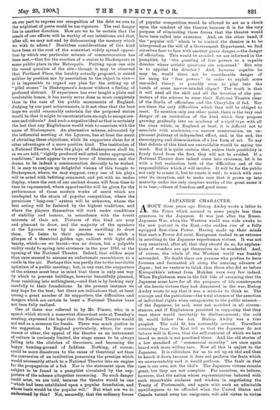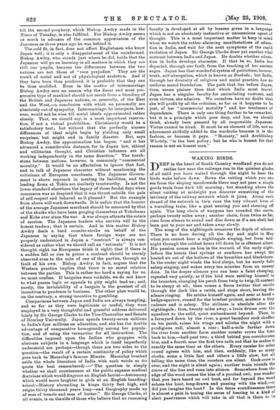JAPANESE CHARACTER.
ABOUT three years ago Bishop Awdry wrote a letter to the Times which seemed to some people less than generous to the Japanese. It was just after the Russo- Japanese War, when the Western world was wide awake to the new portent in the East,—the sudden rise of a fully. equipped first-class Power. Having made up their minds that such a Power did exist, Europeans rushed to an extreme in ascribing to the Japanese superhuman virtues. It was not very unnatural, after all, that they should do so, for explana- tions of wonders are apt themselves to be wonderful. And, of course, the -whole of the Western world was frankly astounded. No doubt there are persons who profess to have foreseen and forecasted all along the amazing advance of Japan; but we venture to think that those who did so before Kuropatkin's retreat from Mukden were very few indeed. When Englishmen were in the full tide of assuming that the Japanese must have for all the purposes of life counterparts of the heroic virtues they had discovered in the war, Bishop Awdry wrote to say that it was a mistake to think so. The courage and the patriotism—the total absence of the assertion of individual rights when antagonistic to the public interest— of the Japanese, he said, were not matched in all circum- stances, and if Englishmen persisted in supposing that they were there would inevitably be disillusionment; the cold fit would follow the hot. Bishop Awdry was a true prophet. The cold fit has noticeably arrived. Travellers returning from the East tell us that the Japanese do not behave well in Korea, that the self-restraint of which we have heard so much is not practised there. And the old stories of a low standard of " commercial morality " are once again heard with more willing ears. Now all this is unjust to the Japanese. It is ridiculous for us to set up an idol and then to knock it down because it does not perform the feats which we unwarrantably said it would perform. The fault in that case is our own, not the idol's. The Japanese virtues remain great, but they are not complete. For ourselves, we believe, however, that the nation whose representatives behaved with such remarkable coolness and wisdom in negotiating the Treaty of Portsmouth, and again with such an admirable unwillingness to be offended when the United States and Canada turned away her emigrants, will add virtue to virtue till the second prophecy, which Bishop Awdry made in the Times of Tuesday, is also fulfilled. For Bishop Awdry seems as much in advance of the common appreciation of the Japanese as three years ago he was behind it.
The cold fit, in fact, does not affect Englishmen who know Japan well; it is only a disappointment of the uninformed. Bishop Awdry, who stands just where he did, holds that the Japanese will go on learning in all matters in which they are still our pupils, because the differences between the two nations are not those of "race prejudice." They are the result of social and not of physiological evolution. And if they have been thus produced, it is probable that they can be thus modified. Even in the matter of intermarriage Bishop Awdry sees no reason why the finest and most pro- gressive type of mankind should not result from a blending of the British and Japanese nations, or, generally, of the East and the West,—a conclusion with which we personally are absolutely out of sympathy. Intermarriage, he interjects, how- ever, would not be wise till social ideals approximated rather closely. That, we should say, is a most important reserva- tion, if not a virtual prohibition. Christianity would be a satisfactory test; but without that the perfectly sincere differences of ideal might begin by yielding only small surprises, but might end in family disaster. But, says Bishop Awdry, the approximation has begun, " and it has advanced a considerable distance, for in Japan law, ethical and utilitarian thought, and Christian influence are all working independently in the same direction." The touch- stone between nations, however, is commonly "commercial morality." It would be an affectation to ignore that fact, and to talk of Japanese character without mentioning the criticisms of European merchants. The Japanese Govern- ment is above reproach in meeting its liabilities, and the leading firma at Tokio are similarly trustworthy. Is not the lower standard elsewhere the legacy of those feudal days when commerce was so despised that it was thrust outside the pale of self-respect and behaved as it pleased ? But the example from above will work downwards. It is unfair that the honour . of the average Japanese merchant should be measured by that of the sharks who have been gorging themselves at Yokohama and Kobe ever since the war. A war always attracts the eaters of carrion. The Japanese traders who survive will be the honest traders ; that is certain. And in this matter Bishop Awdry deals a hard counter-stroke on behalf of the Japanese in saying that where foreign ways are not properly understood in Japan a " contract " is always con- sidered as rather what we should call an "estimate." It is not thought right (as Europeans think it right) that if there is a sudden fall or rise in prices a contract should be sternly observed even to the ruin of one of the parties, through no fault of his own. Bishop Awdry, in fact, argues that the Western practice implies that there is no moral relation between the parties. This is rather too hard a saying for us, we must confess. If bargains were voidable, we do not know to what passes logic or appeals to pity might lead us ; and, surely, the inviolability of a bargain is the greatest of all incentives to prudence in business. The other plan would be, on the contrary, a strong incentive to gambling.
Comparisons between Japan and India are always tempting, and so far as they were legitimate or useful, they were employed in a very thoughtful and graceful address delivered lately by Sir George Clarke to the Vice-Chancellor and Senate of Bombay University. Japan spends twenty-seven millions to India's four millions on education, and she has the double advantage of comparative homogeneity among her popula- tion, and of using the vernacular for all instruction. The difficulties imposed upon the Indian who grapples with abstruse subjects in a language which is itself imperfectly understood are perhaps—though there are two sides to the question—the result of a certain continuity of policy which goes back to Macaulay's famous Minute. Macaulay brushed aside the whole literature of India with such words as (to quote the best remembered) :—" The question is simply whether we shall countenance at the public expense medical doctrines which would disgrace an English farrier—Astronomy which would move laughter in girls at an English boarding- school—History abounding in kings thirty feet high, and reigns thirty thousand years long—and Geography made up of seas of treacle and seas of butter." Sir George Clarke, at all events, is on the side of those who believe that no reasoning
faculty is developed at all by lessons given in a language which is not an absolutely instinctive or unconscious agent of thought. This is a most important matter to keep in mind when we watch the rather alarming manifestations of educa- tion in India, and wait for the next symptoms of the rapid evolution of Japan. Sir George Clarke drew yet another vital contrast between India and Japan. He doubts whether educa- tion in India develops character. If that be so, India has departed, through our fault, from the teaching of her ancient sages. Japan has that wonderful system of patriotism, honour, truth, self-abnegation, which is known as Bushido ; but India, through her diversity of religious and social practice, has no uniform moral foundation. The path that lies before Japan, then, seems plainer than that which India must travel. Japan has a singular faculty for assimilating customs, and even virtues, she admires. We ourselves have no doubt that she will profit by all the criticism, so far as it happens to be just, of her " commercial morality " and her treatment of dependents. There is only one thing further to be remarked, but it is a principle which goes deep, and Las, we should think, already been guessed by all responsible Japanese. Virtue cannot be hired. It must be an element of life, not an adornment skilfully added to the wardrobe because it is the fashion, or because it pays. " Honesty," said Archbishop Whately, "is the best policy ; but he who is honest for that reason is not an honest man."







































 Previous page
Previous page